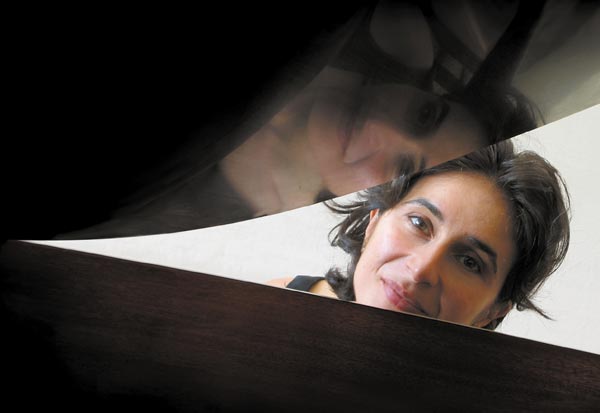 |
|
Eve Egoyan with Dancemakers
Music in the Afternoon Presented by the Women’s Musical Club of Toronto
|
| April 14, 2005 • Walter Hall • Toronto |
|
|
| The programme of this 107th season of the WMCT reads, “An Afternoon of Erik Satie”. Nonetheless, the programme also contains works for piano by three contemporary composers — Evangelista, Tanaka and Norgard, recently recorded by Ms. Egoyam on her CD The Art of Touching the Keyboard, and the subjects of a piece in The Live Music Report.
The six compositions by Satie (1866-1925) are from Ms. Egoyan’s earlier CD Hidden Corners (CBC, 2002). “San Bernardo”, a light-hearted valse, was written by Satie in 1913. The manuscript remained as if lost until discovered by the scholar Robert Orledge who brought it to Ms. Egoyan's attention during the course of a correspondence, and she subsequently gave the piece its world première. Like many of Satie’s pieces of this period, "San Bernardo" was probably composed in Satie’s head during his habitual nocturnal walks around Paris, and set down on paper, without benefit of a piano, the following afternoon, in a café.
|
 |
| From the moment she sits at the keyboard, Ms. Egoyan radiates a sense of complete mental and physical readiness that comes from long periods of becoming familiar with the music, and her playing demonstrates the technique and control of rhythm and tone that Satie’s music of his later period, with its curious absence of expressiveness and emotionality, demands. Since the music is not based on the time axis of tonality, but is based on repetition of small, quick, self contained chordal segments, the elements of rhythm and touch and the particular energy of the performer’s attack becomes a collaborative element in realizing this music. Ms. Egoyan’s performance brought out the sophisticated, urbane qualities of the piece in a manner that is both charming and forceful.
“Avant-dernieres penseés”(1915), and “Trois Nocturnes”(1919) are examples of Satie’s work that is linked to a function such as dance. While she played, dancers from Serge Bennathan’s Dancemakers — Susie Burpee, Alison Denham and Steeve Paquet — performed movements, abstract and enigmatic, more emblematic than metaphorical — supporting the sense of wild freedom flowing from the piano.
Of interest were the two pieces from Satie’s earlier period around 1897. “Little Invitation to the Dance”, and “Cold Pieces” offered a sense of narrative melodic structure, a feeling both tentative and warmly sympathetic, and a soulful evocation of autumnal afternoons. Hard to understand the application of the subtitle “Cockeyed Dances”.
|
|
|
|
We welcome your comments and feedback
|
|
• • • • • •
|
|
| Report by Stanley Fefferman |
• •
|
for The Live Music Report
|
|
•
|
|
|
•
|
|
|
|
|


